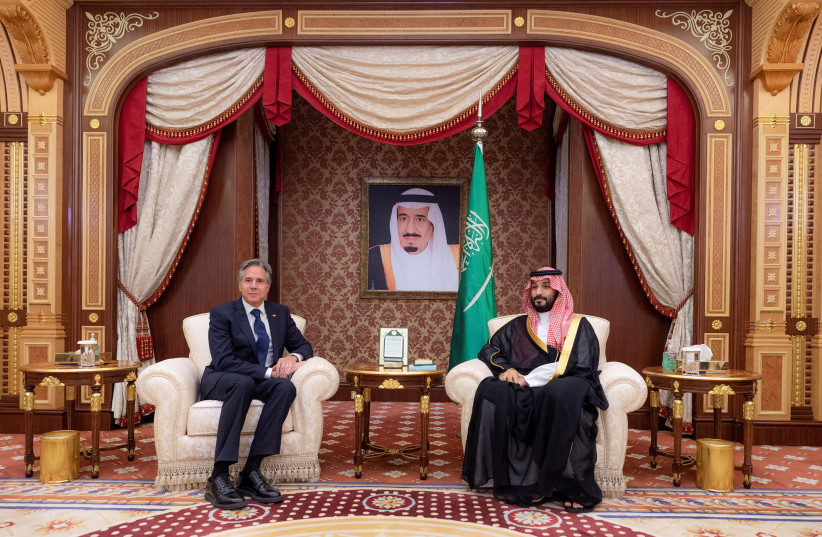Saudi Arabia is currently at the center of a number of important policy moves in the Middle East. These include reports that it is set to host a Chinese business delegation, it hosted Venezuelan President Nicolás Maduro, and Iran reopened its embassy in Riyadh this week.
The icing on the cake was a meeting between Crown Prince Mohammed bin Salman and US Secretary of State Antony Blinken. This is important and touches on possible Israel-Saudi Arabia normalization.
It also showcases how Riyadh has positioned itself in the last year as a center of foreign-affairs accomplishments.
Saudi Arabia's shifting Middle East policies
It’s worth understanding this in context. In recent decades, Saudi Arabia’s policies have shifted. It once was a close partner with the US and a potential broker of Arab-Israeli peace, but it has gone through a roller-coaster of relations since 2015.
Opposition to the Iran deal led to cold shoulders in Washington in some corridors, and things got worse over time with the Gulf crisis between Qatar and the other Gulf states that are close to Riyadh, such as Bahrain and the UAE. But the Abraham Accords and then the reconciliation between Iran and Saudi Arabia, brokered by Iraq and China, have led to a rapid change in Riyadh’s influence.

Blinken’s trip was highlighted in Al Arabiya, Arab News, Al-Ain News and other Gulf media. The reports discussed defeating ISIS and the importance of various generalized policies, such as stability, security and prosperity across the Middle East.
Saudi Arabia has worked on shifting policies in Yemen and also cooperated with the US to help achieve a ceasefire in Sudan. Blinken thanked it for helping to evacuate US citizens from Sudan.
US National Security Council spokesman John Kirby told Al Arabiya English: “We’re focused on the future here. And I’m sure Secretary Blinken, when he gets to Riyadh, that will be the bulk of his messages, moving this relationship forward.”
While some have perceived the US as reducing its focus on the Middle East, the US has indicated this is not the case, with visits like these.
Al-Ain News focused on the discussions about economic cooperation, clean energy and technology. The US had “discussed a comprehensive set of bilateral issues, such as the possibility of normalizing relations between the Kingdom and Israel, issues of Yemen, Sudan, and human rights,” the report said.
The Blinken visit this week is for several days. It is also focusing on Russian and Chinese influence in the region and oil prices, according to reports in the Gulf. Israel and potential normalization is on the agenda as well.
There are a lot of wheels in motion at the moment. Saudi Arabia is trying to juggle a number of initiatives. Among these are the Iran reconciliation and where that might lead, as new embassies are opened and the new ties appear to grow in the direction that both countries want.
Another file is Chinese investment and Beijing’s role. The US wants to reduce tensions with China, but the actual situation in the Pacific is such that it doesn’t appear this will happen soon. Regardless, China will keep trying to increase its role in the region and throughout the world.
There are also the conflicts in Sudan, Yemen and Libya. Riyadh wants to extricate itself from Yemen, but it also wants a kind of Nixon-like “peace with honor,” although not the kind that ends with the Houthis taking over the country. Instead, the deal with Iran is supposed to keep the Houthis from receiving the Iranian backing that led to missile and drone attacks on Saudi Arabia since 2015.
Then there are concerns over Sudan. The civil conflict there must not spill over and should be reduced. At the same time, larger tensions in east Africa need to be managed.
Saudi Arabia has also been at the forefront of bringing the Syrian regime back to the Arab League. As with hosting Maduro and the Iran reconciliation, it appears that Saudi Arabia has rapidly reversed course on a whole host of issues that relate to the wider partnerships that underpin Iran-Venezuela ties and Turkey-Qatar-Venezuela ties.
In essence, what this means is a bunch of countries that have problematic relations with the US are able to speak more with Riyadh these days, including Iran, Venezuela and Syria. Will this impact US policy in Syria, where US forces back the SDF, and will it impact Iraq? Those are key questions. Iraq recently hosted Syria’s top diplomat, for instance.
Even on the sporting front, Saudi Arabia seems to be improving its image.
“The most disruptive year in golf ended Tuesday when the PGA Tour and European tour agreed to a merger with Saudi Arabia’s golf interests, creating a commercial operation designed to unify professional golf around the world,” Al Arabiya reported.
Golf may not be as complex as ties with Iran, but it’s obvious that Riyadh has been able to make a lot of changes that a year ago no one would have predicted. If Saudi Arabia can also move on Israel normalization, that would be another game changer.
